|
|
|
GERI ALLEN
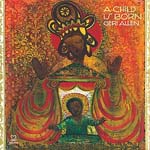 A
Child Is Born A
Child Is Born
Motema
Music
Geri Allen
is a pianist with dazzling technique and a penchant for extended
improvisational forays that keep the listener wondering where she might
go next. Within the thematic context of Christmas standards and
spirituals, “A Child Is Born” presents familiar tunes while allowing
Allen to freely interpret them in her unique fashion, both on acoustic
and electronic keyboards.
Over the
course of 14 tracks ranging from less than a minute to more than seven
minutes, Allen pursues the muse in interesting solo piano explorations
of such traditional holiday fare as “Angels We Have Heard on High,” “O
Come, O Come, Emmanuel,” “We Three Kings,” “Little Drummer Boy,” “It
Came Upon a Midnight Clear,” and a medley combining “Away in a Manger,”
“What Child Is This?” and “Silent Night.”
On
“Angels,” she sets up a catchy riff with strong left-hand runs that
create an infectious counterpoint to her more free-form excursions in
the upper register. The title track by Thad Jones has become a Christmas
classic over the years, and Allen pays it due respect by offsetting
resonant chords with soaring arpeggios and never losing sight of the
melody. “Emmanuel” gets the royal treatment, with concert celeste
chiming the melody along with the piano and setting the stage for
Allen’s keyboard variations and a haunting sampled-vocal accompaniment
by the women of the Gee’s Bend Quilt Collective. On the other hand,
“Kings” is a solo springboard for more adventurous pianistics.
Allen takes
full advantage of the insistent rhythm inherent in “Little Drummer Boy,”
creating a bass pedal point from which she voices harmonic variations on
the theme in an exciting improvisation. The medley is a beautifully
constructed suite that flows naturally from one tune to another. Like
“We Three Kings,” “It Came Upon a Midnight Clear” quickly established
the melody, then allows Allen to range freely.
Allen
occasionally makes brief statements using the Fender Rhodes piano, the
Farfisa organ and the Hohner clavinet, especially on the spirituals,
which include “Imagining Gena at Sunrise” and “Imagining Gena at
Sunset,” based on an Ethiopian melody. Allen is joined by several
singers on her original “Journey to Bethlehem,” inspired, in part, by
the composer’s pilgrimage to the Holy City in 2006, and on her piece
“God Is with Us,” based on a biblical reading from Matthew 1:23.
For
adventurous listeners who prefer Christmas music that resides largely in
the realm of the spirit, “A Child Is Born” is an excellent choice. Those
who want Rudolph or Frosty should look elsewhere.
top |
|
|
|
JACKIE ALLEN
 Love
Is Blue Love
Is Blue
A440
Music
By Tom
Ineck
Jackie
Allen is a song stylist who deserves greater recognition. A Wisconsin
native with extensive jazz and cabaret credentials in Milwaukee and
Chicago, she’s beginning to receive considerable attention in Lincoln,
Neb., where she recently settled with her husband, Hans Sturm, the new
professor of bass at the University of Nebraska-Lincoln School of Music.
Already, Allen has begun a series of classes for aspiring torch singers
and has been booked for the occasional benefit concert or house concert.
“Love Is
Blue” is just one of nine Allen recordings on several labels. Released
in 2004, this diverse collection of 11 tunes brilliantly showcases the
singer’s subtly modulated voice, precise intonation and breathy, dusky
delivery. The classic opener, “Lazy Afternoon,” is a perfect example,
with Allen phrasing the summery, pastoral lyrics with sultry aplomb as
Frank Glover’s clarinet soars lazily over the scene, John Moulder’s
guitar sizzles and Sturm’s resonant bass establishes the relaxed mood.
The
original tunes are equally intriguing, especially Allen’s composition
“Go,” which features the piano of Laurence Hobgood, longtime pianist and
music director for Chicago-based singer Kurt Elling. “Moon of Deception”
is another fitting contribution by Allen, with its painful story of love
betrayed. Moulder’s hopeful “Here Today” is a finely polished pop gem.
The funky Sturm composition “Turnin’ Round” builds on dozens of clever
turns of phrase.
“The
Performer” is a subtle rocker with an irresistible Latin rhythm and
tasteful guitar work by Moulder. By contrast, the title track takes full
advantage of the memorable romantic melody with which the Paul Mauriat
Orchestra scored a huge hit in 1968. Hobgood’s arrangement and Allen’s
reading makes slight and very effective variations in the harmonies.
“Taste of Honey” also is infused with new meaning in a dark and soulful
Moulder arrangement. Allen gives her all in a touching rendition of Alec
Wilder’s lovely ballad “I’ll Be Around,” the set closer.
But the
revelation here is Allen’s heartfelt interpretation of Annie Lennox’s
“Pavement Cracks,” which made its debut just a year earlier on the
composer’s wonderful 2003 release, “Bare.” Allen brings the blues to
bear, Moulder smolders on guitar and Sturm storms broodingly on bass.
We can also
recommend several other Allen releases—2009’s “Starry Night,” 2006’s
“Tangled” and 2003’s “The Men in My Life.”
top |
|
|
|
THE VANGUARD JAZZ ORCHESTRA
 Forever
Lasting: Live in Tokyo Forever
Lasting: Live in Tokyo
Planet
Arts
By Tom
Ineck
We last
reported on the adventures of The Vanguard Jazz Orchestra in 2008,
reviewing a February appearance at the Lied Center for Performing Arts
in Lincoln, Neb., and the big band’s release later that year of “Monday
Night Live at the Village Vanguard,” recorded at their New York City
home just days before traveling to Lincoln.
For its
latest recording, the VJO traveled farther afield. The dual-disc
“Forever Lasting” documents a series of shows Nov. 26-28, 2010, at the
Billboard Live Tokyo, just three months before the seismic natural
disaster that struck Japan. Over the years, the orchestra has developed
a deep relationship with its Japanese fans, who also are sophisticated
students of the jazz art form. It has not gone unappreciated by the
band, which annually tours Japan. This time they got it on tape, and
it’s a doozy.
Like all of
its recordings, this one pays homage to one of the founders of the VJO,
trumpeter and composer Thad Jones, who along with drummer Mel Lewis
formed the creative bedrock of this legendary ensemble. Six of the 13
tracks here are Jones compositions and arrangements, including the
opener, “Low Down,” a tune that swings with typical soulfulness and
provides plenty of solo space for trumpeter Scott Wendholt. “61st
and Rich’ It” is a tuneful, bouncy ditty with flutes floating high above
the front line and a rich trombone solo by John Mosca. One of Jones’
most memorable tunes, the funky “Central Park North,” gets a 12-minute
treatment with notable contributions by Wendholt on flugelhorn, Terell
Stafford on trumpet and Billy Drewes on soprano sax.
“Don’t Ever
Leave Me” is a tender Thad Jones tune with obvious romantic
implications, sensitively rendered by Dick Oatts on flute and Stafford
on flugelhorn. At nearly 19 minutes, Jones’ insanely rapid “Fingers” is
a tour-de-force ramble that draws excellent playing from a string of
soloists, especially Mosca and Stafford. The title track, “Forever
Lasting” is more classic Thad Jones, an easy-swinging, mid-tempo beauty
that showcases Wendholt on flugelhorn and Gary Smulyan on baritone sax.
Well
represented with three compositions is the band’s regular pianist and
arranger Jim McNeely, who was unable to make the gig in Japan and whose
role is ably filled by Michael Weiss. McNeely’s “You Tell Me” is a
devilishly difficult workout for the band, with tricky start-and-stop
rhythms bravura horn exchanges and solid solos from tenor saxophonists
Walt Weiskopf and Ralph Lalama and masterful drumming by John Riley.
With a title suggesting an advanced course in jazz performance, “Extra
Credit” challenges the VJO with complex stop-time sections. “Hardly
Ever” is McNeely in a more relaxed mood.
Bob
Mintzer’s uptempo arrangement of Herbie Hancock’s “One Finger Snap”
provides some of the liveliest and most inspired passages, including
solos by Wendholt, trombonist Luis Bonilla and Weiss. The spotlight is
on alto saxophonist Oatts for the Cole Porter ballad “I Love You.” The
second disc opens with a snazzy Thad Jones arrangement of the standard
“All of Me” featuring Lalama’s robust tenor sax and the rangy, playful
trombone of Jason Jackson. “Nasty Dance” is an outrageous, pulsating Bob
Brookmeyer tune that unpredictably shifts gears and tempos. A vehicle
for Weiskopf’s meaty tenor sax, it’s just downright fun for players and
listeners alike.
The VJO’s
commitment to its enthusiastic Japanese audience continued this year
when the band hosted a benefit concert April 4 to raise funds for the
Japanese jazz community devastated by the recent earthquake and tsunami.
Special guests included Toshiko Akiyoshi, Roy Hargrove, Tom Harrell,
Barry Harris, Lew Tabackin, Kenny Werner, Rufus Reid, Jimmy Owens, Fred
Hersch, Marvin Stamm and others. The event can be viewed on USTREAM at
http:www.ustream.tv/channel/vanguard-jazz-orchestra-live.
top |
|
|
|
By Tom
Ineck
In the
growing field of organ trio recordings, a few stand out. Several months
ago, we reviewed “Wonderful!” the Deep Blue
Organ Trio’s tribute to the music of Stevie Wonder. This time we look at
new releases by two threesomes who are celebrating a decade of making
music together, one fronted by reed virtuoso James Carter and the other
by Sam Yahel, who is equally talented on the Hammond B-3 and piano.
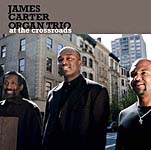 JAMES
CARTER ORGAN TRIO JAMES
CARTER ORGAN TRIO
At
the Crossroads
EmArcy
Records
The James
Carter Organ Trio takes a conventional approach to the organ trio
tradition with “At the Crossroads.” While it adds horns, guitars,
percussion and vocals to some tracks, it remains largely a funky
dialogue among the principles—multi-reed virtuoso Carter, organist
Gerard Gibbs and drummer Leonard King Jr.
Steeped in
Motown R&B influences, Carter and company have produced a tasty slab of
raucous swingers and soulful ballads. “Oh Gee,” a bluesy tune by Matthew
Gee, leaps from the starting gate with irrepressible drive, aided and
abetted by Carter’s brawny tenor sax and the stinging bite of Bruce
Edwards’ guitar licks. Gibbs wrote “JC Off the Set” as a ballad
counterpoint to Carter’s longtime favorite “JC On the Set.” The trio is
alone here, and Gibbs is in fine form working the keyboard dynamics.
The slinky
“Aged Pain” is a typically quirky tune by Ronald Shannon Jackson that
has Carter moaning and wailing on baritone sax with Edwards returning
for some tasteful guitar statements. Carter switches between tenor and
baritone horns on the uproarious uptempo R&B classic “The Walking
Blues,” with blues singer Miche Braden scatting convincingly. The trio
puts the heat on slow simmer for “My Whole Life Through,” then smolders
mid-tempo on the bluesy Jack McDuff composition “Walking the Dog,” with
Edwards comping on guitar.
Things get
downright frantic on the jam tune “Lettuce Toss Yo’ Salad,” while more
subtle rhythmic variations are the key on the alternately moody and
bouncy “Misterio.” Braden returns with a bluesy brass section on
“Rambin’ Blues,” and she gets strong support from the trio as she taps
the traditional gospel repertoire for a soulful reading of “Tis the Old
Ship of Zion.” Drummer King lends his capable baritone voice to
Ellington’s stately “Come Sunday.”
The whole
affair ends with a 10-minute tour de force performance of Julius
Hemphill’s “The Hard Blues.” With half of the 12 tracks stretching
beyond six minutes, “At the Crossroads” is a generous display of the
trio’s stylistic versatility and prodigious improvisational skills.
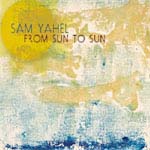 SAM
YAHEL SAM
YAHEL
From
Sun to Sun
Origin
Records
Keyboardist
Sam Yahel has never been a slave to convention. His credits as an
accompanist include sessions with an array of different artists, from
singers Norah Jones, Madeleine Peyroux and Lizz Wright to trumpeters
Nicholas Payton and Ryan Kisor and saxophonist Joshua Redman. However,
his versatility and originality is most appreciated on his recordings as
a leader, half a dozen since his debut in 1998.
“From Sun
to Sun” is one of the strongest entries yet. Bassist Matt Penman and
drummer Jochen Rueckert are sensitive and equal partners in creating
Yahel’s unique sound tapestries. On first listen, tunes such as “2
Pilgrims,” “Saba” and “One False Move” may sound delightfully odd—or
oddly delightful—but the trio is so closely attuned they make the quirky
changes seem inevitable. Even their decidedly different takes on the
standards “A Beautiful Friendship,” “So In Love” and “Taking a Chance on
Love” are apt.
The title
track is especially beguiling, with its shifting rhythms, sliding chord
structure and Yahel’s sudden move from piano to organ and back. It is a
perfect example of Yahel’s deep keyboard vocabulary and his
always-intriguing choice of notes. “Toy Balloon” is appropriately
playful in its irrepressible lilt. Similarly, the rambling “Git It” is
just plain fun.
The brief
interludes “After the Storm,” “Blink and Move On” and “Prelude” act as
links between tunes, reflective breathing spaces and gentle urgings for
the listener to continue. With great music-making like “From Sun to
Sun,” this listener needs no urging.
top |
|
|
|
TOMMY SMITH
 Karma Karma
Spartacus Records
By Tom
Ineck
With “Karma” and a new band of the same
name, saxophonist Tommy Smith takes his music in a brave new direction,
utilizing his keening tenor to great effect in a quartet that epitomizes
the best of jazz fusion and world music. While blazing a new trail, the
band also hearkens to the imaginative and highly refined sound of the
recently defunct Earthworks quartet fronted by drummer Bill Bruford.
Indeed, keyboard virtuoso Steve Hamilton was once a member of that
formidable foursome.
The similarity in the two is most
evident in pieces like “Good Deed,” a driving, progressive—yet
catchy—tune in the tradition of Weather Report. Echoes of Hamilton’s
lovely piano introduction set the mood for “Body or Soul” as drummer
Alyn Cosker establishes a somber march rhythm. The tune soon
accelerates, revealing a folk-like melody that acts as a lively
springboard for call-and-response solos by Smith and Hamilton. Bass
guitarist Kevin Glasgow ranges in the lower registers in a brooding
undercurrent.
Hamilton switches to tambourine to add
Middle Easter-style percussion to Cosker’s trap set on “Tomorrow,” based
on a Yemeni folk song. Behind this insistent rhythm, Smith soars on
tenor. The title track is a funky number that has Smith honking with
soulful abandon as Hamilton, Glasgow and Cosker negotiate the tricky
tempos and time shifts. “Projection” has some devilishly difficult
changes that seem to fall easily under the fingers of all, especially on
Glasgow’s extended bass solo.
Smith and company also are capable of
producing some exquisitely beautiful ballads. “Land of Heroes” begins
with Smith’s trademark haunting tenor seeming to mimic the sound of
bagpipes from his native Scotland. As the title implies, the song
unfolds like an ancient folk legend. Glasgow introduces “Star” with a
bass guitar solo that has more in common with the higher range and
melodic potential of a six-stringed instrument. Smith then states the
Irish melody on which the tune is based and Hamilton offers harmonic
variations.
The inspiration turns to Japan for
“Sun,” with Smith playing the introduction on the bamboo flute, or
shakuhachi, before switching to tenor and taking the rest of the band
into a furious fusion flight.
The 10 tracks that comprise “Karma”
appear in the same sequence as they were written, according to karmic
philosophy, and they each represent an idea connected with that
philosophy. But you don’t need to know that to appreciate the passion
and artistry that Smith, Hamilton, Glasgow and Cosker bring to this
project. Good karma, indeed!
top |
|
|
|
ROSEANNA VITRO
 The
Music of Randy Newman The
Music of Randy Newman
Motema Music
By Tom Ineck
Singer Roseanna Vitro is among the
talented and fortunate jazz artists who have been signed to the
relatively young Motema Music label, which is also home to Monty
Alexander, Randy Weston and Geri Allen. A veteran with some 30 years as
a jazz vocalist, Vitro makes her Motema debut with an unusual—and very
satisfying—tribute to pop music and film tunesmith Randy Newman, her 11th
recording overall.
The project allows Vitro’s supple
contralto to inhabit the landscape of Newman’s stories, which he always
tells in a unique style brimming with Southern imagery, pathos and a
healthy dose of sardonic humor. Witness her poignant reading of “Sail
Away,” an early Newman classic about the ruse that slave traders used to
persuade Africans of a better life in America. On the other hand, she
gives “Last Night I Had a Dream” a Latin tinge courtesy of the new
arrangement by pianist Mark Soskin.
In addition to Soskin, Vitro’s other
capable colleagues include violinist Sara Caswell, bassist Dean Johnson
and drummer Tim Horner, with occasional assists by Steve Cardenas on
guitar and Jamey Haddad on drums and percussion. Caswell’s contributions
are especially effective.
Vitro has an affinity for salsa rhythms,
which return on “If I Didn’t Have You,” an Academy Award winner for the
2002 movie “Monsters, Inc.” One of Newman’s best songs of lost love is
“Every Time It Rains,” expertly handled by Vitro in a bittersweet
rendition. “Baltimore” reminds the listener that life for many in the
modern American city hasn’t improved much since the song’s first
appearance in 1977. Caswell’s pizzicato fiddle and the slippery electric
guitar of Cardenas give the performance a decided edge.
The grim, mysterious imagery of “In
Germany Before the War,” based on the true story of a serial killer in
Dusseldorf, is balanced by the hilarious description of the raucous
party song “Mama Told Me Not to Come,” which the pop group Three Dog
Night turned into a big hit in the early ‘70s. Vitro breathes new life
into the familiar tune with a jazz waltz interpretation. The movie “Toy
Story” yielded the uplifting 2001 composition “I Will Go Sailing No
More,” in which an old fisherman philosophizes about life and dreams of
flying.
“Feels Like Home” is a simple, direct
love song with a memorable hook, but as it develops, it also becomes a
great vehicle for band improvisation, including Soskin on electric piano
and Caswell on violin, with Johnson and Horner always providing solid
support and a tight groove. “Losing You” is the ultimate lost-love song
and receives a heartfelt, tender reading by Vitro, closing an all-around
superb recording by the song stylist.
top |
|
|
|
DEEP BLUE ORGAN
TRIO
 Wonderful! Wonderful!
Origin Records
By Tom Ineck
“Wonderful!” is an especially refreshing
entry in the ever-growing collection of jazz tributes to pop music
icons. Perhaps the reason it works so well is that the Chicago-based
Deep Blue Organ Trio operates in the same irresistible soul groove as
its Motown subject, Stevie Wonder. Organist Chris Foreman, guitarist
Bobby Broom and drummer Greg Rockingham deliver a cohesive sound that
remains funky and swinging throughout this joyful romp.
Foreman leads off with an intriguing
descending line to the familiar main theme of “Tell Me Something Good.”
Broom steps in with a deftly picked, stinging guitar solo that never
loses track of it basis in the blues. “If You Really Love Me”
alternately swaggers with self-assurance and sways with uncertainty, as
though implying some romantic doubt on the part of the protagonist. As
the tune builds, a more positive mood prevails.
The trio smokes unrelentingly on “Jesus
Children of America,” with Foreman creating a formidable walking bass
underfoot while simultaneously flying over the keys, Broom and
Rockingham comping in fast shuffle mode until Broom cuts loose with a
incendiary solo of his own. The classic love song “My Cheri Amour” gets
a loose, relaxed reading that stretches to nearly nine minutes, and
“Golden Lady” gets a bright, jazz-waltz treatment with Rockingham
lightly setting the pace and Broom alternating between Wes
Montgomery-style octaves and single-note runs.
Foreman establishes the bluesy,
mid-tempo groove on “You Haven’t Done Nothin’,” enticing Broom to enter
with funky strumming chords. Broom’s solo is evenly paced and
brilliantly constructed, with occasional flourishes that sparkle and
dazzle. Things slow to an easy stroll for the familiar melody of “It
Ain’t No Use,” then accelerate again for “As,” an infectious shuffle
beat that sets up Foreman for the memorable, repeated hook. Broom
introduces the closer, “You’ve Got It Bad Girl,” with a chorded melody
line, very effectively and faithfully interpreting another immortal
Wonder theme.
The fourth recording by the Deep Blue
Organ Trio, “Wonderful!” displays just how well these three jazz
veterans work together, building the momentum with tunes that average
seven minutes or more, but never becoming redundant or less than
exciting.
top |
|
|
|
THE ROCKY
MOUNTAIN TRIO
featuring JEFF AND TERRI JO JENKINS
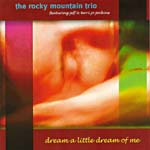 Dream
a Little Dream of Me Dream
a Little Dream of Me
Mile High Music
By Tom Ineck
“Dream a Little Dream of Me” is a
sympathetic collaboration between two old Berman Music Foundation
friends, Denver denizens and former Nebraskans Jeff and Terri Jo
Jenkins. Married for a couple of years, they prove themselves compatible
in more than one way.
For more than a decade, we have
enthusiastically followed the career of the dazzling pianist Jeff
Jenkins, on recordings, on occasional visits to Denver and during his
infrequent Lincoln appearances, usually in a supporting role with
trumpeter Darryl White at the Jazz in June concert series. Over a period
of many years, Terri Jo made a name for herself in Lincoln as a
versatile folk singer-songwriter and as a member of the all-female a
cappella vocal group Baby Needs Shoes.
With this recorded pairing, they marry
their talents and tie the musical knot, so to speak, as they also serve
as very special featured artists with The Rocky Mountain Trio—tenor
saxophonist John Gunther, bassist Ron Bland and drummer Todd Reid. The
mood is largely dreamy and mid-tempo, from the smoothly swaying classic
“Poor Butterfly” to the Afro-Cuban rhythms of the Dizzy Gillespie
feature “Tin Tin Deo,” with its pumping bass line and an inspired
Jenkins piano solo.
Three tunes here are associated with
Duke Ellington, the immortal Billy Strayhorn-penned theme of “Take the A
Train,” the exotic “Isfahan” and Jenkins’ own “Waltz for Ellington,” a
lovely homage to the master that extends to nearly eight minutes without
an extraneous or redundant note. It bounds with the kind of joy that
Jenkins frequently brings to his keyboard excursions as he plays circles
around the chord changes while seeming to luxuriate in the process.
Gunther leads the charge on the soulful
Hank Mobley swinger “Funk in Deep Freeze,” which also is a great vehicle
for Bland’s bluesy bass solo and Jenkins’ two-fisted attack. Jenkins
takes a breather as Gunther switches to flute for a bright and snappy
reading of Mario Bauza’s Latin masterpiece “Mambo Inn,” also featuring
some sensitive brush work by Reid and some masterful bass work that
brilliantly fills the harmonic void in Jenkins’ absence.
With the compatible accompaniment of her
colleagues, Terri Jo seems totally at ease with the three familiar songs
to which she lends her creamy voice, “I Only Have Eyes for You,” “A
Nightingale Sang in Berkeley Square,” and the whimsical title track. The
arrangements are well suited to her vocal range and to her
straight-ahead, folk-rooted phrasing. Her husband is especially
sensitive to Mrs. Jenkins’ vocal style and the way in which she
navigates the changes. Together, they make a very smart couple.
top |
|
|
|
JANE IRA BLOOM
 Wingwalker Wingwalker
Outline
Records
By Tom
Ineck
In a
recording career spanning 30 years, Jane Ira Bloom has never failed to
surprise and satisfy the adventurous listener, a rare accomplishment.
While confining her self to the soprano sax only, she constantly
stretches its range and tone with the use of tasteful sonic
manipulation, a technique that she assures us is “live electronics.”
Aptly
titled, “Wingwalker” is one of her best, a daring, risk-taking
soundscape created by Bloom and compatible bandmates Dawn Clement on
piano and Fender Rhodes, bassist Mark Helias and drummer Bobby Previte.
Clement is relatively new to the scene, but Helias and Previte are jazz
veterans who have always enjoyed challenging musical perceptions—and
misperceptions.
The
haunting opener, “Her Exacting Light,” begins with Clement carefully
mapping out the chord progressions for the others to follow. “Life on
Cloud 8” expands the tonal palette with Previte playfully rambling,
Helias ominously stalking and Bloom inserting some eerie electronica.
Previte sits out “Ending Red Songs,” beautiful acoustic ballad patiently
and perfectly executed. Bloom whimsically bends and stretches notes on
the stop-and-start “Freud’s Convertible,” with Clement adding some
bluesy piano over Helias’s walking bass line and Previte’s sizzling
cymbals.
Bloom and
Clement double the melody line on the spooky, rhythmically free
“Frontiers in Science.” At first listen, “Rookie” seems to have a very
simple, almost elementary structure that is approached tentatively, but
the tune eventually goes uptempo and features some of Bloom’s most
dazzling playing as the sax alternately soars and swoops. “Adjusting to
Midnight” is another ballad minus Previte, freeing the players from time
constraints. The only tune not penned by Bloom is the closer, Lerner and
Loewe’s ballad “I Could Have Danced All Night,” which she performs as a
three-minute solo.
In
retrospect, the recurring themes of aerial adventure (which also include
“Airspace,” “Rooftops Speak Dreams” and the title track) work
beautifully on “Wingwalker,” another bold flight for Ira Jane Bloom.
top |
|
|
|
TRICHOTOMY
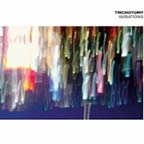 Variations Variations
Naim
Jazz
By Tom
Ineck
The obvious
point of departure for this exciting piano trio is The Bad Plus, but
it’s an easy comparison that does an injustice to both groups. Apart
from a similar sense of fun, dynamics and danger, pianist Sean Foran,
bassist Pat Marchisella and drummer John Parker certainly have a
rightful claim to their own instrumental and compositional prowess on
the 2009 Naim release “Variations.”
Like that
other piano trio, Trichotomy draws from influences as broad as rock,
classical and straight-ahead jazz, but they have their own ideas about
how to utilize them. “Island of the Sun” alternately rocks and playfully
skips along, rising and falling in intensity. With Foran’s shimmering
keyboard impressionism, “At the Right Moment” demonstrates their
penchant for the classics before shifting to a bright swing tempo. A
driving piano riff is at the core of “Branching Out,” but it also has
Foran venturing into some beautiful improvisation.
Guests John
Babbage on alto sax and Christa Powell and Bernard Hoey on violin and
viola, respectively, broaden the trio’s scope on “Start,” and the ballad
“Ascent” features the additional support of trumpeter Peter Knight and
the subtle electronics of Lawrence English. “Variations on a Bad Day”
builds slowly to a demonic climax with Marchisella furiously scraping
the bow over the strings and Foran smashing the keys into submission.
Likewise, “Chunk” lumbers and growls in punk rock fashion.
Relative
calm returns with the hypnotic “Please.” Syncopated handclaps in the
flamenco tradition set up the rhythmic tension of Foran’s piano
excursions on his composition “The Unknown.” The closer, “Labyrinth,” is
a group improvisation whose quirky twists and turns justify its title.
The word
“trichotomy” denotes a splitting into three parts, but this Trichotomy
seems to work as one with a sound that flows seamlessly despite its
often abrupt melodic turns and metric leaps. That seamless flow no doubt
continues with the trio’s follow-up release on Naim, “The Gentle War,”
which was released in February.
top |
|
|
|
PHAREZ WHITTED
 Transient Journey Transient Journey
Owl
Studios
This
progressive, soulful and accessible new release by trumpeter Pharez
Whitted has been a long time coming. A veteran jazz educator with two
CDs as a leader released in the mid-1990s, Whitted has gathered an
equally accomplished, versatile and compatible group of musicians for
“Transient Journey.”
About 10
years ago, Whitted left his position as assistant professor of music at
Ohio State University and moved to Chicago, where a large pool of
first-rate jazz players awaited. Sharing the spotlight on this excellent
recording are Eddie Bayard, tenor and soprano saxes; Bobby Broom,
guitar; Ron Perillo, piano and keyboards; Dennis Carroll, bass; and Greg
Artry, drums.
“The Truth
Seeker” gallops from the gate with funky assertiveness, in a manner
somewhat reminiscent of Bobby Watson and Horizon. Whitted and Bayard
share the upbeat melody and the rhythm section—with Perrillo comping on
electric piano—churns out an irresistible beat. Whitted’s confident
bravura playing reflects his most obvious influence, Freddie Hubbard,
but it always remains tastefully within the context of the group sound.
The title track is moody and slow-grooving, guided by delicately
shifting and shimmering electric piano harmonies and punctuated by brief
solo statements. “Brother Thomas” is a bouncy, mid-tempo tune with
plentiful soul. Solos by Broom, Whitted and Perillo exploit the catchy
chord changes for all their worth.
“Monkish”
pays obvious homage to Thelonious Monk with quirky chords and off-kilter
rhythms taken slightly uptempo, but without slavish mimicry of the
master. The complex time signature of “Plicky” makes for some exciting
interplay when alternating soloists Whitted, Bayard and Broom soar high
over the rhythm section. Whitted wrote the soothing ballad “Sunset on
the Gaza” for the children of the Gaza Strip in the hope that someday
they will enjoy the sunset without the sounds of warfare. Likewise, the
bossa nova “Until Tomorrow Comes” has a hopeful message.
That
hopeful spirit also emerges in the lively funk of “Our Man Barack” and
the brightly swinging “Yes We Can.” Whitted’s optimism fairly leaps from
the horn and is aided and abetted by the rest of the gang.
With over
70 minutes worth of music here, Whitted obviously had a lot on his mind.
We hope he doesn’t wait another decade and a half to express it.
top |
|
|
|
JESSICA WILLIAMS
TRIO
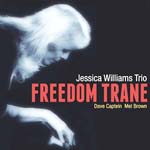 Freedom
Trane Freedom
Trane
Origin Records
Ever since the death of John Coltrane
more than 40 years ago, jazz musicians of every ilk have attempted to
get at the core of his sound, the key to its immutable power and
transcendent spirit. Aside from Coltrane bandmate McCoy Tyner, perhaps
Jessica Williams on “Freedom Trane” comes as close to the source as a
piano player is likely to get.
Four of the eight tunes come from the
Coltrane songbook, but the other half were written by Williams, a very
effective way for her to personalize her homage to the master while
avoiding the urge to simply repeat his ideas. “The Seeker” states
explicitly an admirer’s search for an answer to the riddle that is
Coltrane. It echoes many of the familiar themes but allows Williams to
stretch her formidable talents to create something new.
Coltrane’s dirge, “Lonnie’s Lament,” is
given a respectful treatment, with especially sensitive support by
bassist Dave Captein on both bowed and pizzicato bass and drummer Mel
Brown on both mallets and brushes. With such reliable colleagues,
Williams is free to explore keyboard harmonies and single-note
excursions. The title track is a gospel-tinged original that steams
along the track like the proverbial, well-oiled locomotive. Coltrane and
Sonny Rollins co-wrote “Paul’s Pal,” a playful melody that has Williams
whimsically repeating notes, phrases and variations until the listener
is bound to smile with delight.
Perhaps most telling of all is the
ballad “Prayer and Meditation,” Williams’ expression of the spiritual
essence that was so central to Coltrane’s life. In her ringing chords
and searching flights into the keyboards upper reaches, she successfully
reveals the secret that has thwarted so many. Her composition “Just
Words” follows with some bluesy reflections. “Naima,” easily the most
familiar tune here, is done with great care and precision—beginning in a
ballad tempo, moving to mid-tempo swing and back again—allowing the
pianist a wide scope of solo variations. Williams finishes with
Coltrane’s exquisite 1965 composition “Welcome,” another spiritual
exploration given a finely-wrought, shimmering solo piano performance by
Williams.
A legendary player in the Bay Area and
in Seattle with nearly 40 recordings as a leader, Williams is virtually,
and sadly, unknown to folks who never venture to the West Coast. Like
Coltrane, her performances are electrifying, even transcendent, as she
merges technical prowess, sheer power, confidence and range of emotion
to create an exciting concert experience. In this sense, “The Seeker”
was a logical choice for her latest release. Recorded in December 2007,
it remains a mystery why it was not released until March 2011. We hope
her next project is not so long in fruition.
top |
|
|
|
THE ED PALERMO BIG BAND
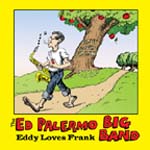 Eddy
Loves Frank Eddy
Loves Frank
Cuneiform Records
By Tom
Ineck
This is the third collection of Frank
Zappa tunes imaginatively arranged and performed by the Ed Palermo Big
Band, so the title comes as no surprise. It is, perhaps, the best one
yet, with the ensemble of 12 horns and a rhythm section cruising through
complex orchestrations with seemingly breathtaking ease. With their high
degree of commitment and respect for the material and an equally high
degree of technical skill, Palermo and his colleagues again raise some
of Zappa’s more obscure instrumental gems to new, unimagined heights.
For example, take the opener, “Night
School.” Originally recorded entirely by Zappa on solo Synclavier for
his Grammy-winning 1986 release “Jazz from Hell,” here it has been given
a dense, driving horn arrangement that veers fearlessly from jazz to
rock and classical influences, including a devastating, note-perfect sax
soli section and some great alto sax improvisation by Palermo himself.
“Echidna’s Arf (of You),” which dates to
1974, rocks even harder, as the rhythm section and horns answer each
other in exciting stop-time passages. Keyboardists Bob Quaranta (on
acoustic piano) and Ted Kooshian (on the versatile Kurzweil organ),
guitarist Bruce McDaniel, bassist Paul Adamy and drummer Ray Marchica
lend potent rhythmic oomph. The horns swing mightily before bringing the
tune to a close after nearly 10 minutes. From 1979’s “Sleep Dirt” comes
“Regytian Strut,” another extravagant example of jazz-rock showmanship.
As FZ himself said, there IS a place for
humor in music, and Palermo demonstrates that with his interpretation of
“Don’t You Ever Wash That Thing?” also from 1974. After a comic
introduction it moves uptempo with a confident swagger and features
outstanding solos by Kooshian, Palermo and McDaniel, whose keening,
controlled feedback and snaking lines remind the listener of Zappa’s own
fret board style. On “Dupree’s Paradise,” the focus is on Quaranta’s
progressive pianism, while both the pianist and tenor saxophonist Ben
Kono share the spotlight on the quizzical and musically challenging
“What’s New in Baltimore.”
Elements of the calliope and other
carnival music arise in “Let’s Move to Cleveland,” with Kooshian’s
Kurzweil approximating the sound of assorted keyboards, vibes and
marimba, some of the composer’s favorite effects. Trumpeter Ronnie
Buttacavoli also contributes to the fun. The CD ends with a heartfelt
rendition of “America the Beautiful,” dedicated by Palermo to his
father, a WWII veteran, whom he calls a “REAL American hero,”
distinguishing him from the “chicken-hawks” who promulgated the wars in
Iraq and Afghanistan. In this sense, Palermo also follows in the
footsteps of Zappa, an outspoken critic of political hypocrisy.
Zappa would have turned 70 in December.
Instead, he produced enough mind-boggling music in his brief 52 years
that bandleaders like Palermo still find new ways to interpret it while
remaining true to its unique spirit. I suspect Frank would approve.
top |
|
|
|
THE COOKERS
 Warriors Warriors
JLP Records
By Tom
Ineck
You can’t argue with either the name of
this band or the title of its debut release. According to the liner
notes by trumpeter David Weiss, the seven musicians here have a combined
professional experience of more than 250 years and have appeared on more
than 1,000 recordings. They are, indeed, jazz warriors who have survived
the ongoing battles of the fickle marketplace. And, their playing
continues to cook with all the heat and intensity of much younger
players.
As composers, arrangers, interpreters,
and improvisers, they are without peer. They are Billy Harper, tenor
sax; Eddied Henderson and Weiss, trumpets; Craig Handy, alto sax and
flute; George Cables, piano; Cecil McBee, bass; and Billy Hart, drums.
Together, they are a formidable team of individuals that tastefully
coalesce like a well-prepared, seven-course meal.
Henderson puts his shoulder to the wheel
on Freddie Hubbard’s “The Core,” leaping through the changes with ease
and passion as the other horns comp with punchy emphasis. Harper adds a
Coltrane-inspired solo, Weiss follows with some new variations, Cables
soars on a dazzling keyboard foray, and Hart caps the tune with a
percussion flurry before Henderson takes it home. It has all the
trademarks, energy and imagination of mid-’60s Miles.
Cables contributes his lyrical and
rhythmically challenging “Spookarella” to the mix with an arrangement by
Weiss. Handy proves his mettle with some brilliant flute work and the
composer adds his own unique touch. The lead voice on McBee’s romantic
ballad “Close to You Alone” is beautifully rendered by Handy, this time
on alto sax, as the rest of the ensemble creates the perfect harmonic
backdrop. Harper wrote and arranged “Priestess,” a powerful cooker that
is an ideal vehicle for Harper’s robust, progressive playing. It also
features fine solos by Weiss on trumpet and Handy on alto. Cables
returns the mood to a lighter vein with the waltzy second movement of
his “Sweet Rita Suite,” entitled “Her Soul.” Weiss’ arrangement has
Handy stating the theme on flute, and Henderson and Cables delivering
brief, but effective solo statements.
The dark colors of Harper’s “Capra
Black” provides for some ominous exchanges between the horns and the
rhythm section, as Cables and McBee make the chords ring with fervor
under Harper’s honking, turbulent tenor. As the 11-minute modal piece
builds, Weiss injects a trumpet passage of swirling intensity and Cables
takes a typically wonderful harmonic excursion to the upper reaches of
the keyboard. McBee wrote and Weiss arranged the final pair of tunes.
“Ladybugg” has a loping cadence and a mysterious melody—somewhat
reminiscent of the “Perry Mason” theme and voiced by the horn ensemble.
Henderson takes a stunning muted solo. “U Phoria” has Harper in the
driver’s seat, but as with the rest of this marvelous recording, it is a
group effort constantly aided and abetted by the expert ensemble of
veterans.
top |
|
|
|
BOBBY WATSON & THE UMKC CONCERT JAZZ ORCHESTRA
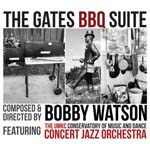 The
Gates BBQ Suite The
Gates BBQ Suite
Bobby Watson Records
By Tom
Ineck
After 25 years in New York City, Bobby
Watson returned a decade ago to the Kansas City area where he was born
and raised to become head of jazz studies at UMKC. It is fitting that he
should direct the school’s concert jazz orchestra in a recorded
performance of his suite celebrating the joys of Kansas City barbecue.
Anyone who has ever eaten at Gates’ BBQ can testify that it has
rightfully become a city landmark of national fame. As Watson writes in
the liner notes, “Kansas City is the Napa Valley of barbecue. Gates’
Barbecue stands alone as king of the valley!”
Watson’s lifelong passion for barbecue
began with childhood visits to Merriam, Kan., where his grandparents
operated a barbecue shop. With his seven-movement suite dedicated to the
Gates family business, he pays tribute to the tradition, often
composing, arranging and titling the pieces to reflect different aspects
of this unique dining experience.
Upon arrival, customers are put at their
ease with a friendly “May I Help You?” and the opening track is so
named. Taken at a light, relaxed tempo, it features the horn section in
its full glory with a muted trumpet solo by Herman Mahari. “Beef on Bun”
is a “meaty” up-tempo number with “smoking” tenor sax exchanges by
William Sanders and Steven Lambert following Nick Grinlinton’s opening
guitar solo. It is a hearty “serving” indeed.
The soulful, loping “Heavy on the
Sauce!” drips with an ideally thick consistency, emitting a pungent
aroma and biting with some spicy alto sax licks by the composer. A
colorful brass chorale launches “Blues for Ollie,” a tribute to Ollie
Gates that walks the blues in stately fashion, thanks to bassist Ben
Leifer and drummer Ryan Lee. It also features solos by trumpeter John
Merlitz, alto saxophonist Michael Shults, pianist Will Crain, Leifer and
Lee.
Percussionists Pablo Sanheuza, Pat
Conway and Andres Rameriz perform an African-style processional march to
introduce “The Presidents’ Tray,” with a special nod to the current
African-American commander-in-chief. The trombones are prominently
featured as they state the theme, leading to a sprightly alto sax solo
by Shults. The ensemble moves confidently through the beautiful chord
changes before the percussion trio re-emerges.
“One Minute Too Late!” expresses
Watson’s very personal response to arriving at Gates’ BBQ after the
doors have closed for the night. He is the only soloist here, and he
plays it to the hilt in a style reminiscent of the romantic dirges of
Barry White, or as the composer writes, “crying and lamenting on my sax
about what could have been.” Watson’s grandparents Jesse and Daisy
Wilkes get their due in the last movement, the funky “Wilkes’ BBQ.” It
has the horns pumping to the insistent beat of Leifer’s bass line and
allows Watson a final, joyous alto solo.
top |
|
|
|
ANDREW VOGT
 Cats
Afoot Cats
Afoot
Drew’s Blues Records
By Tom
Ineck
Jazz eclectic Andrew Vogt continues to
draw on his many and diverse influences for his latest release, the
cleverly-titled “Cats Afoot.” Recruiting the finest players in the
vicinity of Fort Collins, Colo., and deploying them in sextet, quartet
and duo settings, the versatile reed player delivers a satisfying,
smile-inducing recording of mostly original compositions.
The opener is Jeff Lynne’s “On the Run,”
an old ELO tune updated with an upbeat jazz shuffle featuring the twin
tenors of Vogt and Rich Chiaraluce, a friend, mentor and frequent
collaborator. This infectious tune will have you snapping your fingers
in time to the bright and swinging rhythm. Guitarist Bill Kopper also
contributes a lithe, imaginative solo.
“With Trace of Night” is a funky,
rocking number with a vicious backbeat. Vogt, on alto sax, fronts a
tight quartet also consisting of guitarist Kopper, bassist Drew Morell
and drummer Mark Raynes. In his angular, squealing alto forays, Vogt
turns this one every which way but loose. With Vogt on tenor, the
quartet drives through the swinging, rhythmically complex tune, “The
Derailer.” Kopper and Morell deliver outstanding solos, and Raynes weave
polyrhythmic patterns around Vogt’s sax lines.
Kopper shines on fuzz-toned lead guitar
and overdubbed wah-wah rhythm guitar on the snaking, ominous “Groomzilla.”
Of course, Vogt also finds plenty of opportunities to insert incisive
tenor fills. “Pour Deux” pairs Vogt and Chiaraluce on clarinets for a
joyful exercise in skilled interplay. Kopper adds an equally joyful solo
on nylon-string guitar and Mark Sloniker follows with a brilliant piano
solo.
Vogt pays homage to one of his major
influences with “Phil Woodshed,” an uptempo, straight-ahead bopper with
the twin alto saxes of Vogt and Chiaraluce in exciting call-and-response
exchanges. Gabriel Faure’s impressionistic ballad “Pavane” provides the
perfect setting for Sloniker and Vogt, who first states the gorgeous
melody on clarinet before taking it into the jazz realm with variations
on the theme.
The sextet returns with the breezy,
swaying “Say This Way,” the longest tune at just over nine minutes. Vogt
runs the range of his horn with ease in his extended solo statement. It
also features solid solos by Sloniker and bassist Eric Applegate. The
two tenors are paired again on the swing classic “Jeep is Jumpin’,” a
Johnny Hodges composition from the Ellington songbook. Indeed, everyone
is jumpin’ on this uptempo sextet performance.
Vogt picks up the baritone saxophone for
“Light in Shade,” a wonderful, stately piece that amounts to the
composer’s own venture into classical impressionism. Sloniker’s playing
expands beautifully on the melody and harmonic variations in this
exquisite duo performance.
The CD’s title is a little
double-entendre wordplay, reinforced by the cover and sleeve photos of
some very active felines. As Vogt notes, “The cats in the band were
great and hardly anyone shedded!”
top |
|
|
|
THOMAS MARRIOTT
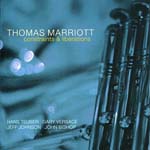 Constraints
& Liberations Constraints
& Liberations
Origin Records
By Tom Ineck
If it were not for Origin Records, many
of the wonderful jazz players of the Pacific Northwest would be unknown
to those of us out here in the hinterlands. Among the most creative of
these is trumpeter Thomas Marriott, a Seattle native who has had five
releases as leader on Origin in the last six years. “Constraints &
Liberations” is the latest, and it may be the best yet.
This time Marriott concentrates on his
own compositions, contributing six of the seven tunes. He fronts a
quintet of veterans capable of confidently performing these often
complex pieces—tenor saxophonist Hans Teuber, pianist Gary Versace,
bassist Jeff Johnson and drummer John Bishop, co-owner of Origin.
The dense “Diagram” gets thing off to a
head-turning, ear-opening start, saying a lot in just over four minutes.
The rhythm section percolates mightily under the horns, which alternate
in dialogue between relaxed and tense lines, and Versace’s solo is a
thing of unique beauty. The tempo is slower and the mood is more
mysterious on “Up from Under,” with Marriott playing with tremendous
passion as his solo builds in intensity. Versace voices his solo and his
comping with unusual chord progressions, urging on Teuber to deliver a
searing solo.
The uptempo title track is open enough
to allow for plenty of improvised variations by Marriott and Teuber as
the rhythm section keeps it pulsing with interesting twists and turns
and Versace contributes another brilliant solo, largely consisting of
well-placed chords. As the title implies, “Waking Dream” is taken at a
dreamy, somnambulistic pace. Marriott plays a breathy muted horn over a
simple, suspended chord structure, and searching solos by Versace and
Johnson expand on the dream theme.
With its optimistic tone, “Early Riser”
does indeed evoke the dawning of a new day. Marriott’s playing hews
closely to his horn’s comfortable middle range, while Teuber ventures
farther afield with leaping tenor lines. Johnson’s “Clue” is a loosely
constructed tune that urges the players to free-blowing expression.
Marriott beautifully stretches his trumpet lines over the framework. As
the piece intensifies, Versace picks up the thread with a minimalist
solo that morphs into something more sinister. The composer’s own solo
is full of warmth and woody resonance.
The title of the final track,
“Treadstone 71,” refers to a secret operation in Robert Ludlum’s book
“The Bourne Identity.” Rhythmically free, it contains elements of
mystery and musical searching. Like the title of this wonderful CD, the
music suggests that much artistic expression combines freedom with
restraint.
top |
|
|
|
KENNY WERNER
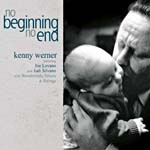 No
Beginning No End No
Beginning No End
Half Note Records
By Tom
Ineck
There is no better example of music as
catharsis than “No Beginning, No End,” pianist Kenny Werner’s 2010
release. The suite for wind ensemble and percussion began nearly five
years ago as a commission from MIT to be performed in May 2007. The
project was dramatically derailed on Oct. 2, 2006, when Werner’s
daughter, Katheryn, was killed in an auto accident. During a long period
of spiritual healing for Werner and his wife, Lorraine, he wrote a poem
entitled “No Beginning, No End.” Suddenly, he had a renewed purpose and
inspiration to return to the commissioned piece.
“I would use phrases from my poem to
create a simple message,” Werner writes. Arising from his belief in
Eastern spirituality and reincarnation, the message is one of
transcendent acceptance. Or, as he writes in the poem:
“Life is not a start,
Death is not an end.
There is no loss
To the God of time.”
“No Beginning No End” is a magnificent
expression of that sentiment in music and words. Astonishingly, Werner
had never written for a large orchestra before this project. In addition
to a 37-piece wind ensemble, it includes multiple percussion
instruments, harp and marimba. One chilling movement, the five-minute
“Visitation: Waves of Unborn,” is performed a cappella by the NYU
Steinhardt choir. “Cry Out” is a piece for string quartet, and the final
“Coda” features a quartet fronted by Werner on piano and also including
vibes, marimba and harp.
Central to the performance is the
impassioned tenor saxophone of Joe Lovano and the ethereal voice of Judi
Silvano. The two overdubbed their parts after the ensemble had laid down
the basic tracks, adding—along with Werner at the piano—jazz
sensibilities to what might otherwise be considered classical music. The
contrast is magical on the opening “Death is Not the Answer.” On “Loved
Ones,” Lovano and Silvano weave their haunting lines amidst a scattering
of accompanying wind instruments. The wind ensemble slowly builds in
intensity on “The God of Time,” inspiring Lovano to a great tenor
flight. “Astral Journey” functions as the centerpiece of the suite, a
musical and spiritual bridge with an uplifting denouement. In “We
Three,” Silvano delivers the reassuring message that a “family of souls
never really part.”
While the Werner family and friends
undoubtedly have a lot of sadness to overcome and a lot of healing yet
to do, “No Beginning No End” is a powerful instrument in that process.
Justifiably, it won Werner a 2010 Guggenheim Fellowship Award.
top |
|
|
|
WIL SWINDLER’S
ELEVENET
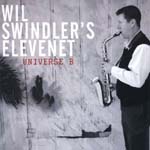 Universe
B Universe
B
OA2 Records
By Tom
Ineck
Amid the dreck that arrives in the mail
for our perusal there are occasional gems of such polished beauty that
they demand acknowledgement, especially if they are by artists deserving
of more recognition. Such is the case with “Universe B,” by Wil
Swindler’s Elevenet. Not exactly a household word, the Elevenet hearkens
back to the days of “Birth of the Cool” and the collaborations of
trumpeter Miles Davis and arranger Gil Evans.
Like Evans, Swindler has assembled a
gifted large ensemble for which he has written and arranged some
demanding, but swinging tunes. Also like Evans, he revels in the darker
brass tones of saxophones, bass clarinet, euphonium, and French horn, in
addition to trumpets, flugelhorns and trombone.
From the opening notes of the title
track, the listener knows he’s in for a delightful ride through unusual
harmonic developments, powered by an insistent rhythmic pulse and
furthered by the brilliant soloing of Dana Landry on the rarely used
Rhodes electric piano, Swindler on soprano sax and Peter Sommer on tenor
sax.
“She’s Too Conflicted” is a gorgeous
Swindler original anchored by a “dialogue” between Gabriel Mervine’s
flugelhorn and Swindler’s alto sax, over a lush brass chorale. The
composer is not without humor, as he proves with the delightful romp
“The Equestrian Pedestrian,” complete with a walking (galloping?) bass
line.
It is not surprising that Swindler was
commissioned by the International Association for Jazz Education to
write a piece honoring Gil Evans. The result is the beautiful, 11-minute
“Glass,” an orchestral masterpiece that also features solos by Mervine
on flugelhorn and the composer on alto sax.
In addition to five original tunes,
Swindler chose three unusual covers. Gil Evans’ arrangement of “Miles
Ahead” is an obvious choice, with its lush brass voicing. Swindler’s
adaptation features Mervine on trumpet. Billy Strayhorn’s “A Flower Is a
Lovesome Thing” gets an arrangement that emphasizes the ballad’s unusual
harmonies and perceived irony. Most daring of all is Swindler’s
beguiling take on George Harrison’s “Blue Jay Way,” a very strange tune
that has been largely neglected in the study and interpretation of The
Beatles.
top |
|
|
|
TOM CULVER
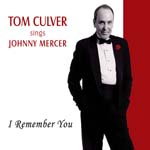 Sings
Johnny Mercer: I Remember You Sings
Johnny Mercer: I Remember You
Rhombus Records
By Tom
Ineck
A good song interpreter can never go
wrong with the material of Johnny Mercer, and the Mel Torme-styled Tom
Culver is no exception. Regardless of tempo, Culver knows how to deliver
a lyric, whether swinging with enthusiasm or caressing a romantic
ballad. With “I Remember You,” Culver delivers a generous package of 18
Mercer tunes, both familiar and obscure, that clocks in at well over an
hour.
One might assume that any competent
wordsmith could have written the lyrics to the music of legendary
composers Jerome Kern, Harold Arlen, Hoagy Carmichael or Henry Mancini,
but it was Mercer whose astute ear, wit and wisdom transformed their
tunes into timeless classics. Mercer could also write memorable music,
and two of his sole compositions are included here.
Pianist Karen Hernandez is largely
responsible for the interesting and varied arrangements, and Culver is
accompanied by a tasteful group of musicians who understand the demands
of supporting a singer without being obtrusive. They include a solid
rhythm section consisting of bassist Lou Shoch, drummers Jack Le Compte
and Gerryck King, multi-instrumentalist Rick Hils on assorted keyboards
and guitar and Don Littleton on congas. Among the exemplary soloists are
saxophonists Ricky Woodard and Jim Jedeikin, trumpeter Nolan Shaheed,
clarinetist Geoff Nudell and guitarist Tom Bethke.
The band swings intently on the opener,
Kern’s “Dearly Beloved,” as Culver demonstrates his supple sound and
rhythmic verve. Arlen’s “Out of This World” is taken as a dreamy samba,
with Culver floating the lyrics in long, languorous phrases. The mood
goes uptempo with another Latin treatment, this time on “Day In, Day
Out.”
One of Mercer’s great, lesser-known
tunes is “Drinking Again,” with music by Doris Tauber. The lyricist is
known for his occasional overindulgence in alcohol, so this
crying-in-your-beer barroom ballad has the ring of truth. With subtle
accompaniment by guitarist Bethke, bassist Shoch, drummer King and Hils
on piano, Culver sings with feeling:
“Drinking again and thinking of when you
loved me,
Having a few and wishing that you were
here,
Making the rounds and buying the rounds
for strangers,
Being a fool, just hoping that you’ll
appear.”
Other highlights include the sensitive
ballad treatment of Hoagy Carmichael’s “Skylark,” capped by an excellent
trumpet solo; an unusually funky take on Arlen’s “One For My Baby,” with
Woodard delivering the bluesy goods on tenor sax; the small jazz club
ambiance and growling trumpet solo on the easy-swinging “Harlem
Butterfly,” with words and music by Mercer; and the New Orleans,
slow-drag tempo on Arlen’s “Any Place I Hang My Hat is Home,” with
appropriate instrumental features for piano, trumpet and clarinet.
Also worth mention is the footloose Rick
Hils arrangement and piano playing on Mercer’s “Something’s Gotta Give,”
a nod to Fred Astaire, who introduced the tune in the movie “Daddy Long
Legs.” King moves the tune along with a steady shuffle beat, and Bethke
contributes a nice solo. Bethke also soars on “Charade” when the Gil
Leib arrangement suddenly goes uptempo.
One of the undeniable classics included
here is “Midnight Sun,” for which Mercer wrote lyrics after hearing the
melody by Sonny Burke and Lionel Hampton. Culver gives it proper respect
with a soothing vocal treatment.
top |
|
|
|

 A
Child Is Born
A
Child Is Born Love
Is Blue
Love
Is Blue Forever
Lasting: Live in Tokyo
Forever
Lasting: Live in Tokyo Karma
Karma The
Music of Randy Newman
The
Music of Randy Newman Wonderful!
Wonderful! Dream
a Little Dream of Me
Dream
a Little Dream of Me Wingwalker
Wingwalker Variations
Variations Transient Journey
Transient Journey Freedom
Trane
Freedom
Trane Eddy
Loves Frank
Eddy
Loves Frank Warriors
Warriors The
Gates BBQ Suite
The
Gates BBQ Suite Cats
Afoot
Cats
Afoot Constraints
& Liberations
Constraints
& Liberations No
Beginning No End
No
Beginning No End Universe
B
Universe
B Sings
Johnny Mercer: I Remember You
Sings
Johnny Mercer: I Remember You